|
|
 |
| |
|
|
|
|
|
| |
|
discography |
|
|
|
| |
|
|
|
|
|
| |
|
Rheinische Kantorei / Das Kleine Konzert
|
|
|
|
| |
|
|
|
|
|
| |
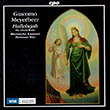 |
Giacomo Meyerbeer (1791-1864)
Geistliche Musik
Rheinische Kantorei
Leitung: Hermann Max
Cantantine "Hallelujah" für 4 Männerstimmen, Orgel, Chor ad libitum; Motette "Psalm 91" für Soli & 8-stimmigen Chor; Cantique für Bass, 6-stimmigen Chor, Orgel; Pater Noster für Chor a cappella; 7 Geistliche Gesänge für 4 Soli & Chor a cappella; An Mozart für 4 Männerstimmen a cappella
Bei JPC probehören / bestellen ... |
|
|
|
| |
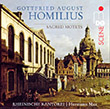 |
Gottfried August Homilius (1714-1785)
Geistliche Motetten
Rheinische Kantorei
Leitung: Hermann Max
© 1984, Neuauflage 2015 MDG 602 0145-2
Vor mehr als
30 Jahren bereits hat Hermann Max mit der Rheinischen Kantorei einige
Motetten des damals nahezu vollkommen vergessenen Gottfried August
Homilius für MDG aufgenommen. Dass er mit dieser Pioniertat
am Anfang einer regelrechten Renaissance des Bachschülers Homilius
stand, konnte niemand ahnen. Die nur auf Vinyl veröffentlichte
Produktion war lange vergriffen. Umso willkommener ist jetzt die
sorgfältig aufbereitete CD-Neuauflage dieses schon historischen
Schatzes aus dem MDG-Archiv.
Bei JPC probehören / bestellen ... |
|
|
|
| |
 |
Ludwig Meinardus (1827-1896)
Luther in Worms (Oratorium)
Matthias Vieweg, Catalina Bertucci, Clemens Löschmann, Annette Gutjahr, Corby Welch, Markus Flaig u.a.
Rheinische Kantorei
Concerto Köln
Hermann Max
2 CDs cpo 777 540-2…
Bei JPC probehören / bestellen ... |
|
Groß besetztes Oratorium „Luther in Worms“
Der Reformator Martin Luther wird im Rahmen der Lutherdekade bzw. im Vorfeld des Reformationsjubiläums 2017 in zahlreichen Veranstaltungen und Veröffentlichungen geehrt. Und auch cpo stellt diesen Monat das Oratorium „Luther in Worms“ von Ludwig Meinardus in einer Aufnahme vom 22. Festival Knechtsteden vor. Hermann Max präsentiert das üppig besetzte und opernhafte Hauptwerk von Meinardus mit dem renommierten Orchester Concerto Köln und einer erlesenen Sängerbesetzung. Ludwig Meinardus gehörte, nachdem er gegen Widerstände der Eltern das Musikerdasein durchsetzte und dabei durch Schumanns und Mendelssohns Beurteilungen hart ausgebremst wurde, einer pietistischen Erweckungsbewegung an. In ihr gingen Nationalismus und Protestantismus Hand in Hand. Dennoch ergeht sich Meinardus’ Hauptwerk nicht in hohlem Bombast und heroischer Attitüde, sondern wartet mit mancher musikalischer Raffinesse auf, die gerade auch die Figur Luthers charakterisiert. Er selbst nannte es ein "ideelles Drama", was konkret eine stark opernhafte Gestaltung unter Einbeziehung räumlicher Effekte (Türmerfanfaren, nahender Ritterzug, Rufe der Reichsherolde) meinte. Es gliedert sich in zwei Teile, der erste ist mit 'Die Fahrt nach Worms' überschrieben, der zweite mit 'Vor Kaiser und Reich'. Klassik.com schrieb nach der Aufführung: „Meinardus verlangt ein beträchtliches Aufgebot an Ausführenden. Neben einem großen Orchester sind dies sieben Solisten, ein gemischter Chor in verschiedenen Aufteilungen bis hin zum Doppelchor sowie (eigentlich) ein Knabenchor. „Die Rheinische Kantorei war sowohl in gemischter als auch in reiner Frauen- bzw. Männerbesetzung bis hin zum Tripelchor gefordert und führte damit einmal mehr vor Augen und Ohren, wie idealer Chorklang in Bezug auf Ausgewogenheit und Aussprache sein sollte. Hermann Max führte das stark erweiterte Concerto Köln mit frischen Tempi souverän durch alle Schwierigkeiten der Partitur.“
(Konzertkritik bei klassik.com 9 / 2013). |
|
| |
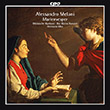 |
Alessandro Melani
Marienvesper
Solisten der Rheinischen Kantorei
Das Kleine Konzert
Hermann Max
cpo 777 936-2
Bei JPC probehören / bestellen ... |
|
Anspruchsvolle Vespermusik
Zwar wurde Alessandro Melanis Bedeutung als Komponist von Opern und
weltlichen Oratorien in Rom vor Alessandro Scarlatti früh erkannt, seine
zahlreichen geistlichen Kompositionen hingegen blieben aber weitgehend
unbeachtet. Die vorliegende Auswahl soll einen Eindruck vom Rang auch
dieser Kompositionen vermitteln. Biographisch ist wenig über Melani
bekannt. 1639 in Pistoia in eine Familie von Musikern geboren, ist er
spätestens 1667 als Kapellmeister an der Basilika S. Maria Maggiore in
Rom nachweisbar. 1672 wechselt er nach S. Luigi dei Francese, wo er bis
zu seinem Tod arbeitet. Die Kirchenmusik ist also seine Domäne, und
dennoch schreibt er regelmäßig große Opern, durch die er berühmt wird.
(z. B. veröffentlicht auf cpo seine Mini-Oper „Europa“ , 4481639, cpo
777 408-2). Die hier zusammengestellten Vesper-Kompositionen Alessandro
Melanis für ein oder zwei Chöre, Gesangssolisten und Generalbaß haben
alle einen festlichen Charakter und erklangen wahrscheinlich in einer
der gut ausgestatteten Kirchen Roms, möglicherweise in Santa Maria
Maggiore oder San Luigi dei Francesi, an denen Melani als Kapellmeister
wirkte. Solisten der Rheinischen Kantorei interpretieren die
„Marienvesper“, die viele höchst anspruchsvolle Solopartien enthält, in
bewährter Weise mit dem Kleinen Konzert unter Leitung von Hermann Max. |
|
| |
 |
Georg Philipp Telemann
Oratorium für die Goldhochzeit Mutzenbecher
Herr Gott, dich loben wir und Serenata O erhabnes Glück der Ehe
Hannah Morrison, Margot Oitzinger, Markus Schäfer, Immo Schröder, Matthias Vieweg, Christos Pelekanos
Das Kleine Konzert, Hermann Max
cpo 3506399
Bei JPC probehören / bestellen ... |
|
Telemanns große Hochzeitsmusik
Der 1653 in Kiel geborene Matthias Mutzenbecher hatte 1669 in Hamburg seine Ausbildung zum Kaufmann begonnen, sich 1678 selbstständig gemacht und war schon bald ein renommierter Bürger Hamburgs geworden: Senator, Oberst des Bürger-Regiments und sogar Gerichtsherr. Ein gewichtiger Mann und Gönner des städtischen Musikdirektors Georg Philipp Telemann. Für die Festmusik zu seiner Goldenen Hochzeit 1732 war für diesen hochmögenden Mann das Beste gerade gut genug. Bei einer damals geringen Lebenserwartung von etwa 40 Jahren war eine Goldene Hochzeit schon recht ungewöhnlich. Der Festtag begann mit einem geistlichen Oratorio, bei dessen Klängen der Senator mit seiner „Eheliebsten“ zur Einsegnung vor den Altar traten. „Der gantze Hoch-Edle Rath war in seinem Staats-Habit zugegen.“ Der anschließende Festschmaus fand im Haus des ältesten Sohnes statt. Dabei erklang nun die Serenata, der weltliche Teil der Hochzeitsmusik, worin ein „Wettstreit der leiblichen Glückselig-keiten des Ehestandes in einer Tafelmusik zu Gehör gebracht“ wurde, wie es der Textdruck formuliert. Vermittelt das Oratorio noch ein ehrwürdiges Klangbild durch Trompeten und Pauken, so entfaltet die Serenata ihre heitere Beschwingtheit durch eine äußerst abwechslungsreiche Instrumentierung. Hermann Max fügt hiermit seinen Telemann-Entdeckungen einen weiteren Edelstein hinzu. |
|
| |
 |
Johann Sebastian Bach (1685–1750)
Motetten BWV 225-230
Rheinische Kantorei, Hermann Max
cpo 3506398
Bei JPC probehören / bestellen ... |
|
Bach-Motetten – Neue Interpretationswege
Sie sind die Meisterwerke des Chorgesangs schlechthin, die Motetten von Johann Sebastian Bach. Von den meisten wissen wir nicht genau, wann und zu welchem Anlass sie geschrieben wurden, aber sie alle haben Texte zur Grundlage, die sich mit den letzten Dingen des Lebens beschäftigen. Glück und Leid prägten die Menschen zur Zeit dieser Motetten heftiger als wir uns das heute vorstellen können und kein Komponist vermochte im 18. Jahrhundert Leid und die Sehnsucht nach Frieden und Glück so wie Bach mit einem realistischen Blick in die menschliche Psyche zu vertonen. Hermann Max beschreitet mit der Rheinischen Kantorei neue Wege zu einer Interpretation des Bachschen Motettenkosmos. Auf vorliegender CD ist auch die Motette BWV Anh. 159 aufgenommen worden, da die Bach-Forschung zur Überzeugung gekommen ist, dass diese Motette, die lange Johann Christoph Bach zugeschrieben wurde, doch J. S. Bach zuzuordnen ist, da sie eindeutig seine musikalische Handschrift trägt. |
|
| |
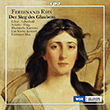 |
Ferdinand Ries (1784-1838)
Der Sieg des Glaubens, op.157
Oratorium in neuzeitlicher Erstaufführung Christiane Libor, Wiebke Lehmkuhl, Markus Schäfer, Markus Flaig, Rheinische Kantorei, Das Kleine Konzert, Hermann Max
Veronika Winter, Lena Susanne Norin,
Jan Kobow, Ekkehard Abele ,
Rheinische Kantorei, Das Kleine Konzert
Hermann Max
cpo 4916782
Bei JPC probehören / bestellen ... |
|
Beethovens begabter Schüler Ferdinand Ries war nie ganz unbekannt, aber erst in den letzten Jahren setzen sich cpo und auch Hermann Max sehr erfolgreich für eine Neuentdeckung des beseelten Spätklassikers und Romantikers ein. Dessen erstes Oratorium „Der Sieg des Glaubens“, das erstmalig seit 1829 wieder erklingt, feiert den Triumph der „sanftmütig Glaubenden“. Ries schrieb das Werk als Kompositionsauftrag für das Niederrheinische Musikfest in Aachen 1829. Der im Rheinland geschätzte Literat Johann Baptist Rousseau (1802–1867) (nicht zu verwechseln mit seinem französischen Namensvetter Jean-Baptiste Rousseau) verzichtete in dem Werk vollständig auf eine durchgehende Handlung und entspannt vielmehr einen philosophischen Diskurs über die Kraft des Glaubens und die Gnade Gottes. Die auftretenden Figuren sind gleichsam entpersonifiziert. Sie unterscheiden sich im Wesentlichen nur durch ihre Zugehörigkeit zur großen Gruppe der Gläubigen oder zur kleinen Gruppe der Ungläubigen. Ries trägt dem in seiner Vertonung mit vielen eindrucksvollen Chor- und Ensemblesätzen Rechnung, wobei er den Chor der Gläubigen immer wieder in Frauen- und Männerchor aufteilt. Die Arien setzen weniger auf Virtuosität als vielmehr auf eine intensive, am Sprachfluss orientierte Textausdeutung. Ähnliches gilt auch für die Chorsätze, die oft durch einen effektvollen, harmonisch reizvollen Orchesterpart gewürzt sind. Die Aachener Uraufführung war ein überwältigender Erfolg für Ferdinand Ries, von dem er seinem Bruder Joseph bald darauf »mit sehr vieler Freude« nach London berichtete: »Mein Oratorium ist so aufgenommen worden, daß das ganze Haus gezittert hat – es ist das größte und effektvollste Werk, was ich geschrieben habe, aber die Aufnahme hätte ich mir so nicht denken können, alles war rein toll, und wahrer Jubel herrschte überall.« |
|
| |
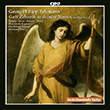 |
Georg Philipp Telemann
Gott Zebaoth in deinem Namen
Cantatas Vol. 2
Veronika Winter, Lena Susanne Norin,
Jan Kobow, Ekkehard Abele ,
Rheinische Kantorei, Das Kleine Konzert
Hermann Max
cpo 777 261-2
Bei JPC probehören / bestellen ... |
|
|
|
| |
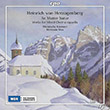 |
Heinrich von Herzogenberg
An Mutter Natur
Werke für gemischten Chor a cappella
Rheinische Kantorei unter der Leitung von
Hermann Max
cpo 777 728-2
Bei JPC probehören / bestellen ... |
|
|
|
| |
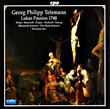 |
Georg Philipp Telemann
Lukas-Passion 1748
(Mitschnitt von den Magdeburger Telemann-Festtagen 2010 / Ersteinspielung)
Veronika Winter, Anne Bierwirth, Julian Podger, Clemens Heidrich, Matthias Vieweg,
der Rheinischen Kantorei und dem Kleinen Konzert unter der Leitung von Hermann Max
cpo 777 601-2
Bei JPC probehören / bestellen ... |
|
|
|
| |
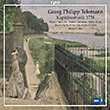 |
Georg Philipp Telemann
Kapitänsmusik von 1738
(Konzertmitschnitt vom Festival Alte Musik Knechtsteden 2007)
mit Veronika Winter, Cornelia Samuelis, Jan Kobow, Immo Schröder, Ekkehard Abele, Gregor Finke,
der Rheinischen Kantorei und dem Kleinen Konzert unter der Leitung von Hermann Max
cpo 777 386-2
Bei JPC probehören / bestellen ... |
|
|
|
| |
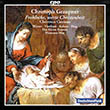 |
Christoph Graupner
Frohlocke, werte Christenheit (Weihnachtskantaten)
Veronika Winter (Sopran), Franz Vitzthum (Altus),
Jan Kobow (Tenor), Markus Flaig (Bass),
Das Kleinen Konzert
Bei JPC probehören / bestellen ... |
|
„In der Pracht und Vielfalt der Musikentfaltung stand der landgräfliche Hof von Hessen-Darmstadt, zumindest in der ersten Hälfte des 18. Jahrhunderts, auch größeren Musikzentren wie Hamburg oder Mannheim kaum nach. Die Darmstädter Hofkapelle muss über ein beachtliches musikalisches Niveau verfügt haben. Unumschränkter Herrscher in diesem musikalischen Reich war für fünf Jahrzehnte der Hofkapellmeister Christoph Graupner. Er war ein universeller Geist und äußerst originärer und origineller Komponist, der leider viel zu sehr in Vergessenheit geraten ist. Dem wollen wir, zusammen mit Hermann Max und seinem Barockorchester Das Kleine Konzert, jetzt zum zweiten Mal abhelfen (1. Graupner-CD: 8359381). Eingespielt wurden fünf Weihnachtskantaten Graupners. In den Werken aus den 1740er Jahren zeigen sich bereits Merkmale seines aparten Spätstils. Hörbar wird ein Komponist des Spätbarock, der (wie sein Freund Telemann) immer auf der Suche nach neuen Ausdrucksmöglichkeiten war – eine reine Freude!“
|
|
| |
 |
Johann Sebastian Bach (1685 - 1750)
Weihnachtsoratorium BWV 248
Veronika Winter, Wiebke Lehmkuhl,
Jan Kobow, Markus Flaig
listen to / order at JPC ... |
|
Hermann Maxenjoys particular renown for landmark interpretations of 17th and 18th century repertoire with his Rheinische Kantorei and Kleine Konzert. Alongside the great “classic” masterworks, Max has maintained a keen interest in reviving forgotten works, enthusiastically collaborating with our producer, Burkhard Schmilgun: the Ferdinand Ries recordings are a convincing example. But the time was come to finally document Max’s interpretation of perhaps the most popular sacred work of the great cantor of St. Thomas. Devoid of any fussiness, with sharp rhythmic precision and brisk tempi, here, in brilliant surround sound, is a Christmas Oratorio for the 21st century!
“The sixteen voices of the Rheinische Kantorei and Das Kleine Konzert perform with their customary assurance, offering poised instrumental solos and a strong continuo group throughout...the acoustic of the Knechtsteden Basilica magnifies the splendor of their sound…for anyone in search of an excellent performance of the Christmas Oratorio, this interpretation offers an alternative to previous productions which is well worth considering.” (Bernd Heyder in Concerto, Dec. 2009/Jan. 2010)
“Heavenly sounds for Christmas…a performance that captivates the listener with lively yet grounded, sensitive music-making and fascinating text interpretation. The tempi are fresh throughout, but never rushed; the chorales lack any hint of heaviness; winds and strings play at the highest level, always at the service of the nimble, radiant choir as well as the soloists…The brilliant surround sound of the recording adds the final touch to this riveting listening experience.” (Heide Oehmen, Neuss-Grevenbroicher Zeitung, 3.12.09)
“What arose was a freely flowing performance, reminiscent of chamber music in style, more dance-like than stately, technically near perfect, resisting any pompous, sentimental tendencies…duplicating the relaxed virtuosity and lightness heard in the opening chorus of the fifth cantata with its pulsating fugue would be a challenge indeed.”
(Markus Schwering, Kölner Stadtanzeiger, 26.11.09) |
|
| |
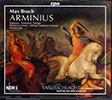 |
Max Bruch (1838-1920)
Arminius
Oratorium op. 43
Hans Christoph Begemann, Michael Smallwood,
Ursula Eittinger
Rheinische Kantorei, Göttinger Symphonie Orchester
Ltg.: Hermann Max
listen to / order at JPC ... |
|
In February of the year 1875, Max Bruch stumbled across an epic poem written by the young Westphalian gymnasium teacher J. Cüppers, reporting enthusiastically to his publisher, Simrock, “the verses are glorious, with a dithyrambic sweep; melodies spring from this beautiful rhythm all on their own.” So, at the same time that the Hermann monument was being dedicated in the Teutoburger Forest near Detmold, Max Bruch sat in the home of friends in the Bergisches Land and composed Arminius. The work, which is based on the historic Battle of the Teutoburger Forest, where the Roman army under Varus was defeated, has a wonderfully coherent dramatic structure: the elaboration of the struggle between oppression and liberation creates a tension which increases continuously through the four parts of the work. The final section, “The Battle,” represents the grandiose highpoint of the work, but avoids falling into embarrassing nationalistic pathos. The text of Bruch’s Arminius can only be understood in the context of the founding of the German Reich in 1871; musically the work reaches us today: a true masterpiece by this still underestimated contemporary of Brahms.
“Hermann Max breathes fiery new life into the newly unearthed work, leading a particularly committed choir of remarkable solidity. Despite the sometimes ungrateful recitatives which fall to them, the trio of soloists fulfill their tasks conscientiously, where Ursula Eittinger’s Priestess, to whom the score’s most beautiful arias are entrusted, deserves special mention.” (Jean-Claude Hulot, Diapason, 1/2010)
“Though few in number, the well-versed professionals of the Rheinische Kantorei brilliantly show the work’s masterful choral movements to best advantage…Conductor Hermann Max leads the Gottingen Symphony Orchestra at a remarkably high level, and attaches the greatest importance to revealing not only the elaborate scoring, but above all the intense atmosphere of the oratorio. Max scrupulously avoids pathos and overblown patriotism, and, with his cultivated, multifaceted interpretation, rehabilitates a work unjustly discredited and forgotten.” (Ernst Naredi-Rainer, Kleine Zeitung, Graz, 09.01.2010)
“…thoroughly excellent performance…”
(NDR, CD-Tipp, 04.07.09)
“…astonishingly good results…”
(www.opusklassiek.nl, August 2009) |
|
| |
 |
Carl Heinrich Graun (1703-1759)
Große Passion "Kommt her und schaut"
(Graun WV B: VII: 5)
Veronika Winter, Hilke Andersen, Markus Schäfer, Ekkehard Abele
listen to / order at JPC ... |
|
Alongside 28 operas, the Prussian court musician C. H. Graun left behind a great number of sacred compositions. Among them, his very successful passion cantata Der Tod Jesu enjoyed wide popularity and was performed up until the end of the 19th century. However, Graun had previously written three other passions, including one written in Wolfenbüttel in 1730, Kommt her und schaut. The vast scope of this work, which contains 66 movements, led to the designation of “Grosse Passion.” Through the enormous variety of forms and instrumentation found in the many movements, as well as an intense inner dynamic, the work testifies to the astonishing maturity of the then about 25-year-old composer, and justifies ranking Kommt her und schaut as a masterpiece among North German passion cantatas. |
|
| |
 |
Georg Friedrich Händel (1685-1759)
Israel in Ägypten (Fassung von Mendelssohn 1833)
Monika Frimmer, Veronika Winter, Heike Grötzinger, Hans Jörg Mammel, Ekkehard Abele, Gregor Finke
listen to / order at JPC ... |
|
There is hardly another work Mendelssohn turned to as often during his conducting career as Handel’s oratorio Israel in Egypt. As a great admirer of Handel and of “early music,” he finally successfully led a revival of the work at the Niederrheinisches Musikfest on 26 May 1833 in Düsseldorf – and further performances were planned. Mendelssohn had discovered a score of the work in London, and his critical study of the available editions compared to the original source defined his performance. Thus, it was at this concert in Düsseldorf that the phrase “based on the original score” was used for the first time. In addition, with the help of the London conductor George Smart, an old libretto, according to Mendelssohn “used under Handel,” was found. The uniformly positive newspaper critiques of Mendelssohn’s performances praised above all “the clear diction, which is so seldom given adequate consideration.” |
|
| |
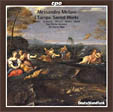 |
Alessandro Melani (1639-1703)
L'Europa & Geistliche Werke)
Winter, Samuelis, Wessel, Haller, Abele
cpo 448 16 39
listen to / order at JPC ... |
|
Although Melani is surely among the most under-appreciated composers of the 17th century, he was the author of the best setting of the “Don Giovanni” story prior to Mozart’s, with his L’empio punito of 1669. The music of his mini-opera Europa is so fresh, so intelligent, and so theatrical, that it earns him a place among the ranks of such first-rate composers as Cavalli, Cesti and Scarlatti. |
|
| |
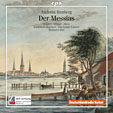 |
Andreas Romberg (1767-1821)
Der Messias (1802)
Oratorium nach Friedrich Gottlieb Klopstock
Veronika Winter (S), Markus Schäfer (T), Ekkehard Abele (B), Bernhard Scheffel (T), Immo Schröder (T)
cpo 777 328-2
listen to / order at JPC ... |
|
This record has been realized in cooperation with Deutschlandradio Kultur, ZEIT-Stiftung Ebelin und Gerd Bucerius and cpo and with the kind support of Kunststiftung NRW. |
|
| |
 |
FERDINAND RIES
Die Könige in Israel
ein Oratorium in zwei Teilen
Nele Gramß, Gerhild Romberger, Ewa Wolak, Markus Schäfer, Harry van der Kamp, Marek Rzepka, Kai Florian Bischoff
JPC 714238, 2007
listen to / order at JPC ... |
|
This recording was a co-production with the Westdeutsche Rundfunk (WDR). Produced in 2005 during the Festliche Tage Alter Musik Knechtsteden it was supported by the Kunststiftung NRW and the Stiftung Kulturpflege und Kulturförderung der Sparkasse Neuss. It is the first recording of the work, whose first performance in 1873 in Aachen was a great success receiving applause after each and every section. |
|
|
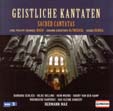
|
C.P.E. BACH, JOHANN CHRISTOPH ALTNICKOL,
GEORG BENDA
Geistliche Kantaten
Schlick, Helling, Meens, van der Kamp
Capriccio 67192, 1988/2007
listen to / order at JPC ... |
|
"Thanks to the exquisite and highly motivated interpreters, it is easy to understand why Benda was no less famous in his time as a church composer than as the creator of experimental musical theatre pieces. With flashing eyes and real ambition in their voice, the choir blasts the "Du wagst es, du Lästerer, Gott zu versuchen?" (You dare to tempt God, you Blasphemer?) at its ‘atheistic listeners. One is allowed to recover from such dismay during an equally rich and subtly decorated aria sung by the alto Hilke Henning with the nightingale timbre of Barbara Schlick."
(Carsten Niemann in "Rondo", 5/2007) |
|
|
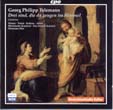
|
GEORG PHLIPP TELEMANN
Kantaten „Drei sind, die da zeugen im Himmel“
Winter, Norin, Kobow, Abele
cpo 777 195-2, 2007
listen to / order at JPC ... |
|
"Max’ sensitive and differentiated interpretations, which he has been able to realise thanks to excellent soloists and a wonderfully harmonical ensemble, manage to do the ingenious composer complete and utter justice."(klassik.com 10/07) |
|
|

|
JOHANN SEBASTIAN BACH / arr. ROBERT SCHUMANN
Johannes-Passion
Winter, Scholl, Romberger, Kobow, Abele, Heidrich
cpo 777 091-2, 2007
listen to / order at JPC ... |
|
Martin Hoffmann in „Concerto“ (10/11/2007): With excellent soloists – led by Jan Kobow as the banished evangelist, Max succeeds in the production of a recording which enables the listener to gain insights into Bach’s St John’s Passion from a new and unfamiliar historic perspective.“ |
|
|
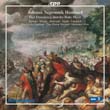
|
JOHANN NEPOMUK HUMMEL
Oratorium „Der Durchzug durchs Rote Meer“
Kermes, Winter, Mammel, Abele, Friedrich
cpo 777 220-2, 2006
listen to / order at JPC ... |
|
Benjamin G. Cohrs in „Klassik heute“ (19/01/07): "Hermann Max has made a first-class discovery and succeeded in an exemplary interpretation."
|
|
|
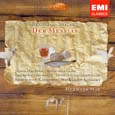
|
GEORG FRIEDRICH HÄNDEL
WOLFGANG AMADEUS MOZART
Oratorium "Der Messias" (KV 572)
Frimmer, Georg, Prégardien, Schreckenberger
EMI Classics 51198-2, 1992/2006
listen to / order at JPC ... |
|
W. Goertz in FonoForum 7/92: "Max’ enthusiastic elan, which swept away any sort of historic patina, is equally conveyed in this recording. […] The overall exquisite ensemble of soloists seemed well assembled, and the Rheinische Kantorei presents itself yet again as a gleaming, sleek choir. The star of the month!" |
|
|
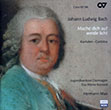
|
JOHANN LUDWIG BACH
Kantaten „Mache dich auf, werde licht“
Schlick, Nichols, Jochens, Varcoe
Carus 83.186, 1981/2006
listen to / order at JPC ... |
|
Matthias Hengelbrock in „Fono Forum“ (9/2006): "The manner in which Hermann Max led vocal and instrumental declaiming in 1981 continues to set an example today." |
|
|
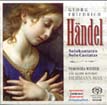
|
GEORG FRIEDRICH HÄNDEL
Solokantaten
Veronika Winter / Das Kleine Konzert
Capriccio 71083, 2006
listen to / order at JPC ... |
|
"These cantatas are primarily a feast for the voice and Händel exploits the vocal potential to the full. […] The female soloist delights with a stylistically apt, beautifully sounding and clearly intonated performance. She completes the coloraturas with admirable ease and also has a beautifully, lyrical legato. And as she sings her fourth up to ‘Excelsis’, it is as if the heavens open.", 25/01/07) |
|
|

|
JOHANN GOTTLIEB NAUMANN
Oratorium „Betulia liberata“
Gramß, Haller, Schäfer, Mammel, van der Kamp
cpo 777 063-2, 2006
listen to / order at JPC ... |
|
Andreas Friesenhagen in „Fono Forum“ (8/2006): "The homogenous and well balanced quintet of soloists present a particular stroke of luck. All of them are precise interpreters of text and follow Naumann and Metastasio deep into the finest complexities of their musical speech." |
|
|

|
CHRISTOPH BERNHARD
Geistliche Harmonien
Winter, Gramß, Voss, Kaiser, Abele
cpo 777 046-2, 2005
listen to / order at JPC ... |
|
"Herman Max achieved the perfect equilibrium between the vocal and instrumental plane and created transparent a work of aural transparency. A recording for the reference section." (klassik.com 03/06) |
|
|
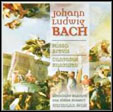
|
JOHANN LUDWIG BACH
Missa brevis / Kantaten
Zadori, Wessel, Jochens, Schreckenberger
Capriccio 67131, 1993/94, 2005
listen to / order at JPC ... |
|
Erwin Hösi in „Concerto“ (Dez./Jan. 2005/06): "Incomparable precision in the phrasing, pure intonation and completely transparent lines add up to an immaculate and most pleasurable listening experience." |
|
|
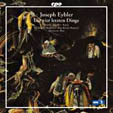
|
JOSEPH EYBLER
Oratorium „Die vier letzten Dinge“
Scholl, Schäfer, Kooij
cpo 777 024-2, 2005
listen to / order at JPC ... |
|
Detmar Huchting in „Klassik heute“ (13.04.05): "The multi-coloured score, which is rich in dramatic effects, is being probed in a simultaneously sensitive and fiery manner." |
|
|

|
FRANZ TUNDER
Geistliche Konzerte
Rheinische Kantorei / Das Kleine Konzert
cpo 999 943-2, 2004
listen to / order at JPC ...
|
|
Neuß-Grevenbroicher Zeitung (31/03/05): "Forgotten Beauties!" |
|
|

|
LEOPOLD ANTON KOZELUCH
Oratorium „Moisè in Egitto“
Kermes, Perillo, Schäfer, Sol
cpo 999 948-2, 2003
listen to / order at JPC ... |
|
“Supersonic Award“ 1/2004 der Zeitschrift „Pizzicato“: "As always really, the performance by the Kleine Konzert under Hermann Max’ leadership is no less than outstanding. … The magnificent choir also knew how to convince through similar presence and sovereignty."
|
|
|
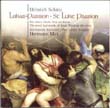
|
HEINRICH SCHÜTZ
Lukas-Passion
Kleine Geistliche Konzerte
Die sieben Worte Jesu am Kreuz
Capriccio 67019, 2003
listen to / order at JPC ... |
|
Martin Mezger in „Stereoplay“, 6/03: "Hermann Max and his Rheinische Kantorei interpret this work with clarity, flexibility and appropriate, never exaggerated drama, combining the strict tone of Holy Week with musical explicitness to perfection. "
|
|
|
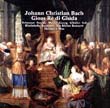
|
JOHANN CHRISTIAN BACH
Oratorium “Gioas - Rè di Giuda”
Staude, Frimmer, Georg, Wessel, Schäfer, Sol
cpo 999 895-2, 2002
listen to / order at JPC ... |
|
Detmar Huchting in „Klassik heute“, 2/2003: "Hermann Max and his artists do not short-change with their agility, and reveal scholarship and authenticity."
|
|
|
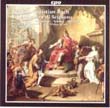
|
JOHANN CHRISTIAN BACH
Opera seria “La Clemenza di Scipione”
Perillo, Wolff, Waschinski, Schäfer, Mammel
cpo 999 791-2, 2002
listen to / order at JPC ... |
|
Matthias Hengelbrock in „Klassik heute“, 7/2002: "Building upon the pliable orchestral sound and the elegant articulation of the Kleine Konzert, Hermann Max creates soaring structures,whilst at the same time he manages to create moments of high tension through the use of frugal impulses." |
|
|
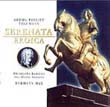
|
GEORG PHILIPP TELEMANN
“Serenata eroica” - Trauerkantate auf den Tod Augusts des Starken
Schlick, Winter, Schüller, Mammel, Mertens, Abele
Capriccio 67004/5, 2002
listen to / order at JPC ... |
|
Hans-Jürgen Becker in der FAZ, 28/06/02: "Hermann Max leads the Rheinische Kantorei, and the Kleine Konzert which plays on original instruments, displaying his usual sense for detail, rhythmical finesse and a preference for crystal-clear sound structures."
|
|
|
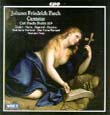
|
JOHANN FRIEDRICH FASCH
Ouvertüre B-dur
Kantate “Du sollst Gott, deinen Herrn, lieben”
Kantate “Wir müssen alle offenbar werden”
Zádory, Norin, Mammel, Mertens
CARL FRIEDRICH FASCH
Motette “Heil dem Manne, der rechtschaffen lebet” (119.Psalm)
cpo 999 594-2, 2002
listen to / order at JPC ... |
|
"A choir and orchestra in a brilliant mood!" (Fono Forum 6/2002) |
|
|
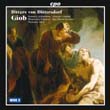
|
KARL DITTERS VON DITTERSDORF
Oratorium “Giob”
Lichtenstein, Perillo, Waschinski, Duddeck, Schäfer, Abele
cpo 999 790-2, 2001
listen to / order at JPC ... |
|
Matthias Hengelbrock in „Klassik heute“, 1/2002: "As always, Hermann Max presents his rediscovery in a rounded, resilient and transparent overall sound, which allows the work’s elegance to unfold well.Matthias Hengelbrock in „Klassik heute“, 1/2002: As always, Hermann Max presents his rediscovery in a rounded, resilient and transparent overall sound, which allows the work’s elegance to unfold well." |
|
|
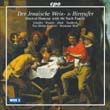
|
JOHANN NIKOLAUS BACH
Singspiel “Der Jenaische Wein- und Bierrufer”
JOHANN CHRISTIAN BACH
Lieder “Mezendore”, “Der Weise auf dem Lande”
WILHELM FRIEDRICH ERNST BACH
Lieder “Das Gesetzbuch”, “Der Vorsatz”, Der Pfad des Lebens”
Duetto comico “Der Dichter und der Komponist”
JOHANN CHRISTOPH BACH
Hochzeitskantate “Meine Freundin, du bist schön”
Winter, Duddeck, Schäfer, Wagner, Abele
cpo 999 797-2, 2001
nicht mehr lieferbar |
|
|
|
|
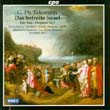 |
GEORG PHILIPP TELEMANN
Oratorium “Das befreite Israel”
Ouvertüre f-moll, Musikalisches Idylle “Der May”
Schmithüsen, Schubert, Crook, Mertens, Abele
cpo 999 673-2, 2001
listen to / order at JPC ... |
|
Susanne Benda in „Klassik heute“, 9/2001: "Hermann Max elicits scenes of great structural sharpness and dramatic power from his ensemble." |
|
|
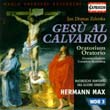
|
JAN DISMAS ZELENKA
Oratorium „Gesù al Calvario“
Cordier, Schmithüsen, Malikowa, Wessel, Norin
Capriccio 10887/88, 2001
listen to / order at JPC ... |
|
Frank Hilberg in “Die Zeit”, 8.3.01: "Zelenka’s original orchestral language, including his entire palette of symbolic affect and pictorial expression has been revealed under the leadership of Hermann Max in an exemplary fashion thanks to the Rheinische Kantorei and Das Kleine Konzert."
|
|
|
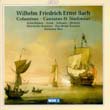
|
WILHELM FRIEDRICH ERNST BACH
Kantaten & Sinfonien „Columbus“
Schmithüsen, Crook, Schwarz, Mertens
cpo 999 672-2, 2000
listen to / order at JPC ... |
|
FonoForum 2/01:"a well-balanced ensemble of singers … an excellently disposed orchestra, …an epiphany of sound and richness of colour."
Fanfare 4/01: "I continue to be thrilled by the excellent Das Kleine Konzert, an orchestra that plays beautifully without sacrificing a drop of excitement." |
|
|
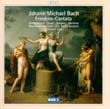
|
JOHANN MICHAEL BACH
Friedens-Cantata
Schmithüsen, Crook, Schwarz, Mertens
cpo 999 671-2, 2000
listen to / order at JPC ... |
|
Westfälische Nachrichten, 4/12/00: "A true discovery. The music is slickly but powerfully composed, orchestrated with originality and may well be compared with that by the best of its time. Max facilitates all of this in a rather exciting, almost passionate manner." |
|
|
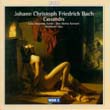
|
JOHANN CHRISTOPH FRIEDRICH BACH
Kantate „Cassandra“
Norin
cpo 999 593-2, 2000
listen to / order at JPC ... |
|
FonoForum 1/01: "A piece which demands strong concentration of the performers and their audience. High standards which are evidently met by Norin and Max.
Early Music Magazine 2/01: A strikingly effective Italian cantata. A very desirable CD."
Fanfare 4/01: "A highly impressive interpretation"
|
|
|
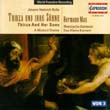
|
JOHANN HEINRICH ROLLE
Musikalisches Drama „Thirza und ihre Söhne“
Schmithüsen, Wessel, Mammel, Schäfer, Abele
Capriccio 10868/69, 2000
listen to / order at JPC ... |
|
Andreas Waczkat in Concerto 5/00: "The choir sounds slender and pliable as does the orchestra. The soloists please with clear timbre and a strong overall clarity. It is worthy of stressing that the artists are really committed to the notion of a musical drama." |
|
|
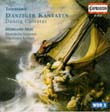
|
GEORG PHILIPP TELEMANN
Danziger Choralkantaten
Schmithüsen, Schubert, Crook, Mertens
Capriccio 10853, 2000
listen to / order at JPC ... |
|
Wolfgang Hirschmann in Concerto 11/00: "Perfect declamation and intonation are evident, the choir-sound full, yet lean and of an unobtrusive expressivity, which has become the trademark of Hermann Max’s interpretations." |
|
|
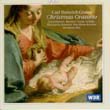
|
CARL HEINRICH GRAUN
Weihnachtsoratorium
Schmithüsen, Norin, Schäfer, Mertens
cpo 999 707-2, 1999
listen to / order at JPC ... |
|
Constanze Holze in Concerto 12/00: "This recording is yet again characterised by perfectly gliding crescendi and decrescendi, supple phrasings and a dashing almost sporty quality. Dynamic flexibility is as evident as the supple elegance of the movements with melodic emphases." |
|
|
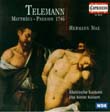
|
GEORG PHILIPP TELEMANN
Matthäus-Passion (1746)
Jochens, Mertens, Winter, Schüller, Hübner, Scheffel, Abele
Capriccio 10854, 1999
listen to / order at JPC ... |
|
Stefan Heßbrüggen in Rondo 3/99: "Hermann Max and Das Kleine Konzert present apt and accurate musicianship and are able to rely upon characteristically cast soloists led by the most excellent Wilfried Jochens as the Evangelist." |
|
|
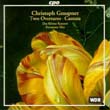
|
CHRISTOPH GRAUPNER
Ouverturen in G und D
Kantate "Es begab sich, daß Jesus in eine Stadt mit Namen Nain ging"
Schlick, Meens, Varcoe
cpo 999 592-2, 1999
listen to / order at JPC ... |
|
Andreas Friesenhagen in Concerto 6/99: "What is striking is the fine elegance, the captivating sound and the reliably subtle rhetorical gesture, all of which combine to turn these pieces into a highly pleasurable musical entertainment."
Gramophone 7/99: "Das Kleine Konzert is on fine form, rhythmically buoyant and disciplined throughout."
American Record Guide 8/99: "I loved this CD."
|
|
|
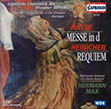
|
JOHANN ADOLF HASSE
Messe in d
JOHANN DAVID HEINICHEN
Requiem Es-Dur
Zádori, Norin, Mammel, Mertens
Capriccio 10570, 1998
listen to / order at JPC ... |
|
Thomas Gebhardt in Concerto 6/99: "Four soloists who are obviously completely at home with this kind of music. … Orchestra and the Rheinische Kantorei are equally sublimely disposed – tonal balance and precision are immaculate, the choir’s intonation captivating and the overall musicianship flawless."
Robert Strobl in Alte Musik Aktuell 6/99: "The combination of the four soloists alone was more than accidental! Alongside stands a choir, which under this leadership features amongst then very finest Early Music Ensembles. The orchestra’s playing is loose, light-footed, elegant and agile and thinks and feels ahead." |
|
|
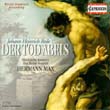
|
JOHANN HEINRICH ROLLE
Musikalisches Drama „Der Tod Abels“
Schmithüsen, van der Kamp, Schreckenberger, Mammel, Schüller, Winter
Capriccio 10825, 1998
listen to / order at JPC ... |
|
Ingeborg Allihn in Fono-Forum 10/98: "Hermann Max and his brilliant vocal soloists along with the precise choir and the meticulously disposed instrumentalists deserve praise for this allround convincing First Recording. The lively live recording leaves nothing else to be desired."
|
|
|
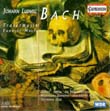
|
JOHANN LUDWIG BACH
Trauermusik
Zádori, Norin, de Mey, Mertens
Capriccio 10814, 1998
listen to / order at JPC ... |
|
Christoph Braun in Rondo 3/98: "Alongside the delightfully pulsating instrumentalists of the Kleine Konzert with their resilient phrasing, Max has put a vocal quartet, which is equally delicate in its articulation and eagerness of expression."
|
|
|
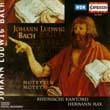
|
JOHANN LUDWIG BACH
Motetten
Capriccio 10560, 1998
listen to / order at JPC ... |
|
Christoph Braun in Rondo 3/98: "Beatifully ballanced across all its voices, the Rheinische Kantorei finds the exactly apt sound for these works due to its usual unpretentious facility and intricate vocal lines."
|
|
|
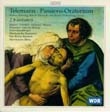
|
GEORG PHILIPP TELEMANN
Passions-Oratorium "Betrachtung der 9.Stunde an dem Todestage Jesu" (TWV 5:5)
Kantate "Ein Mensch ist in seinem Leben wie Gras" (TWV 4:18)
Kantate "Herr, ich habe lieb die Stätte deines Hauses" (TWV 2:2)
Zádori, Wessel, Cordier, Jochens, Schreckenberger, van der Kamp, Wimmer
cpo 999500, 1997
listen to / order at JPC ... |
|
M. Hengelbrock in FonoForum 5/97: "An impressive range, which not only reveals retrospectively the impressive stylistic development of Telemann, but also sheds new light on the extraordinary quality of his early works."
I. Dorfmüller in Concerto 11/97: "Ther are only few conductors who know Telemann’s music as intricately as Hermmann Max. Minute details are as important to him as an unmistakable sense for the overall proportions. And his musicians are 100% reliable." |
|
|
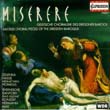
|
JAN DISMAS ZELENKA
Miserere c-moll
JOHANN ADOLF HASSE
Miserere c-moll
JOHANN DAVID HEINICHEN
Magnificat A-Dur
GOTTFRIED AUGUST HOMILIUS
Kantate "Verwundrung, Mitleid, Furcht und Schrecken"
Zádori, Schlick, Wessel, Jochens, Meens, Schreckenberger, Varcoe
Capriccio 10557, 1996
listen to / order at JPC ... |
|
Deutscher Schallplattenpreis "Echo Klassik"1996
(German LP Prize)
I. Allihn in FonoForum 3/96: "Hermann Max ensures the overarching structure of Zelenka’s dense polyphonic movement with a string sense for the stylistic technicalities, from the melting Belcanto of Hasse, Master of Opera, to the sensitive expression of Heinichen and Homilius. To achieve this, Max has brilliant soloists at his disposal, whose voices blend beautifully. Both choires articulate well and impress with their engaged musicality and a never drooping inner tension." |
|
|

|
JOHANN SEBASTIAN BACH
Matthäus-Passion (BWV 244)
Frimmer, Winter, Norin, Prégardien, Jochens, Mertens, Wimmer
Capriccio 60046-2, 1996
listen to / order at JPC ... |
|
M. Enslein in Stereo 4/96: "Hermann Max holds a trump card in tenor Christoph Prégardien. Having said that, his other soloists are of equal quality. The choir presents his commentaries slender-voiced and reacts with exemplary clarity where artful interjections are required."
R. Strobl in Alte Musik Aktuell 5/86: "The most perfect recording of Bach’s St Matthew’s Passion to date. … future recordings should be measured against this one. Recording of the month!" |
|
|
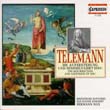
|
GEORG PHILIPP TELEMANN
Oratorium "Die Auferstehung und Himmelfahrt Jesu"
Frimmer, Winter, Koch, van der Meel, Mertens
Capriccio 10596, 1995
listen to / order at JPC ... |
|
K.P. Richter in FonoForum 6/96: "Hermann Max uses his excellent ensemble to stress the dominant side of the music by producing a sensitive, highly transparent and three-dimensional chamber-music sound. The musicianship of the vocal soloists is equally clear, precise and excellent."
|
|
|
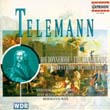
|
GEORG PHILIPP TELEMANN
Kantate "Der Herr ist König"
Kantate "Die Donnerode"
Monoyios, Schlick, Köhler, Jochens, Schreckenberger, van der Kamp, Wimmer
Capriccio 10556, 1995
listen to / order at JPC ... |
|
F.P. Messmer in FonoForum 7/95: "It is thanks to the commitment of Hermann Max and his musicians that justice is now also being done to the vocal music of Telemann, which presents itself in this recording as a surprisingly captivating, exciting text-based composition full of pictures and intense expression. Excellent soloists! Sound: opulent with a wide dynamic spectrum and good spatial effect." |
|
|
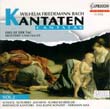
|
WILHELM FRIEDEMANN BACH
Kantate "Dies ist der Tag"
Kantate "Erzittert und fallet"
Schlick, Schubert, Jochens, Schreckenberger
Capriccio 10426, 1993
Diapason d'or Mai 1994
listen to / order at JPC ... |
|
F.P. Messmer in FonoForum 5/94: "The Rheinische Kantorei demonstrates agility, drama and tension in its singing and articulation. Das Kleine Konzert presents a highly empathetic musical interpretation of the text. A particular stroke of luck is the ensemble of soloists, which shows musical homogeneity in both voice and musical interpretation. The bright and clear voice of Barbara Schlick, the warm alto of Claudia Schubert, who avoids the haziness of too much vibrato, the sensuality and softness of the Tenor, Wilfried Jochens, and the colourfull Bass of Stefan Schreckenberger turn this recording into an experience." |
|
|
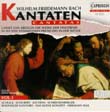
|
WILHELM FRIEDEMANN BACH
Kantate "Lasset uns ablegen die Werke der Finsternis"
Kantate "Es ist eine Stimme eines Predigers in der Wüste"
Schlick, Schubert, Jochens, Schreckenberger
Capriccio 10425, 1993
Diapason d'or Mai 1994
listen to / order at JPC ... |
|
F.P. Messmer in FonoForum 5/94: "Hermann Max demonstrates the transcendent significance of Friedemann Bach through this exemplary and convincing recording." |
|
|

|
GEORG PHILIPP TELEMANN
Oratorium "Der Tag des Gerichts"
Monoyios, Cordier, Jochens, Schreckenberger
Capriccio 10413, 1993
listen to / order at JPC ... |
|
M. Hengelbrock in FonoForum 6/93: "Fiery temperament and certain feeling for style, Hermann Max succeeds in presenting a very three-dimensional interpretation of Telemann’s loved vocal poem (Singgedicht)." |
|
|

|
JOHANN SEBASTIAN BACH
Messe in h-moll (BWV 232)
Koslowsky, Winter, Wessel, Brutscher, Schreckenberger, Wimmer
Capriccio 60033-2, 1993
listen to / order at JPC ... |
|
|
|
|
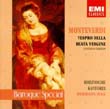
|
CLAUDIO MONTEVERDI
Vespro della beata vergine - Marienvesper (Continuo Version)
Koslowsky, Lins, Jochens, Brutscher, Wessel, Schreckenberger, Wimmer
EMI Classics 54546, 1993
nicht mehr lieferbar |
|
|
|
|
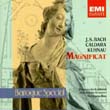
|
JOHANN SEBASTIAN BACH
Magnificat Es-Dur (BWV 243a)
Sanctus C-Dur (BWV 237)
Sanctus D-Dur (BWV 238)
ANTONIO CALDARA
Magnificat C-Dur
JOHANN KUHNAU
Magnificat C-Dur (Ersteinspielung)
Magnificat D-Dur (Ersteinspielung)
EMI Classics 54426-2, 1992
nicht mehr lieferbar |
|
|
|
|
|
JOHANN SEBASTIAN BACH
CARL HEINRICH GRAUN
GEORG PHILIPP TELEMANN
Passions-Pasiccio "Wer ist der, so von Edom kömmt" (Welt-Ersteinspielung)
JOHANN SEBASTIAN BACH
Kantate "Herr Jesu Christ, wahr' Mensch und Gott" (BWV 127)
Lins, Popken, Brutscher, Wimmer
EMI Classics 54244-2, 1991
nicht mehr lieferbar |
|
M. Hutzel in FonoForum 10/91: "With this recording Hermann Max has delivered another building block of his scientifically sound and musically convincing reclaiming of works originating from Johann Sebastian Bach’s contemporaries. … During the choir and choral sections, the Rheinische Kantorei convinces through faultless intonation and empathic interpretation of the text." |
|
|
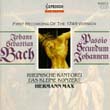
|
JOHANN SEBASTIAN BACH
Johannespassion (Ersteinspielung der Fassung von 1749)
Lins, Röschmann, Popken, Prégardien, Brutscher, Schwarz, Wimmer
Capriccio 60023-2, 1991
listen to / order at JPC ... |
|
A. Beaujean in stereoplay 7/91: "An extraordinarily lively, dramatically tense rendition by a small, capable and hard-working ensemble. Good soloists amongst the choir and the orchestra." |
|
|
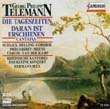
|
GEORG PHILIPP TELEMANN
Kantate "Die Tageszeiten" (TVWV 20:39)
Kantate "Daran ist erschienen die Liebe Gottes" (TVWV 1:165)
Schlick, Cordier, Helling, Prégardien, Meens, Varcoe, van der Kamp
Capriccio 10319, 1991
listen to / order at JPC ... |
|
FonoForum 7/91: "This pastoral cantata adds to the list of commendable Telemann recordings by Capriccio. All those involved, choir and orchestra, are utterly convincing." |
|
|
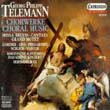
|
GEORG PHILIPP TELEMANN
Missa brevis (TVWV 9:14)
Motette "Deus judicium tuum" (TVWV 7:7)
Kantate "Alles redet itzt und singet" (TVWV 20:10)
Schlick, Lins, Cordier, Weisheit, Prégardien, Varcoe, Wimmer
Capriccio 10315, 1990
listen to / order at JPC ... |
|
F.P. Messmer in FonoForum 2/91: "With the aid of his magnificent ensemble of soloists, Max succees in the revivification of this music’s humour and beauty. And he does Telemann justice!" |
|
|
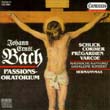
|
JOHANN ERNST BACH
Passionsoratorium
Ode "Das Vertrauen der Christen auf Gott"
Motette "Meine Seele erhebt den Herrn"
Schlick, Lins, Cordier, Weisheit, Prégardien, Schmitz, Varcoe
Capriccio 10310/11, 1990
nicht mehr lieferbar |
|
F.P. Messmer in FonoForum 7/90: "Choir and orchestra play together in scrupulously rehearsed stylisic unity. … experiental playing and singing of every tone! And in respect of the vocal soloists, Max had an equally magic touch." |
|
|
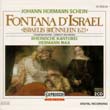
|
JOHANN HERMANN SCHEIN
Fontana d'Israel / Israelsbrünnlein (1623) - Gesamtaufnahme
CARL PHILIPP EMANUEL BACH
Motette "Gott, deine Güte reicht so weit"
Motette "Oft klagt dein Herz, wie schwer es sei"
JOHANN PHILIPP KIRNBERGER
Motette "Erbarm dich, unser Gott"
JOHANN FRIEDRICH DOLES
Motette "Wer bin ich, Herr?"
JOHANN ADAM HILLER
Motette "Laß sich freuen alle, die auf dich trauen"
Motette "Alles Fleisch ist wie Gras"
Capriccio 10290/91, 1990
nicht mehr lieferbar |
|
G. Schubert in Stereo 7/90: "Schein mediates uniquely between the Italian and the German musical culture. The meticulous interpretation does both aspects of the works justice in a rather unobtrusive manner and offers an historically accurate recording free from exaggerated energy."
|
|
|
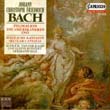
|
JOHANN CHRISTOPH FRIEDRICH BACH
Kantate "Pygmalion"
Kantate "Die Amerikanerin"
Kantate "Ino"
Schlick, van der Kamp
Capriccio 10303, 1990
nicht mehr lieferbar |
|
V. Fischer in Stereo 10/90: "Amongst three cantatas, ‘Die Amerikanerin’ (The American Woman’) set to the text by H.W.v.Gerstenberg is held in great esteem amongst musical connoisseurs. In the course of his half-hour versions of 'Pygmalion' and 'Ino', the composer, who was friends with Herder, presents himself as a master of recitatives. Top marks for interpretation and sound quality!" |
|
|
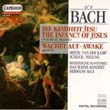
|
JOHANN CHRISTOPH FRIEDRICH BACH
Oratorium "Die Kindheit Jesu"
Motette "Wachet auf, ruft uns die Stimme"
Fünf geistliche Lieder auf Texte von Balthasar Münter
Schlick, Lins, Helling, Kirchner, Meens, Schwarz, van der Kamp
Capriccio 10292, 1989
nicht mehr lieferbar |
|
|
|
|

|
CARL PHILIPP EMANUEL BACH
Kantate "Zur Einführung des H.P.Gasie" (Wq 250)
Kantate "Wer ist so würdig als du" (Wq 222)
Kantate "Der Herr lebt" (Wq 251)
Schlick, Helling, Jochens, Schwarz
Capriccio 10209, 1988
listen to / order at JPC ... (Gesamtedition) |
|
Deutscher Schallplattenpreis 1988 (German LP Prize)
K. Breh in stereoplay 6/88:" … cantatas by CPE Bach so far unlisted in the Bielefelder Katalog and presented in excellent interpretations and with magnificent sound quality."
|
|
|
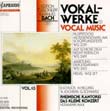
|
CARL PHILIPP EMANUEL BACH
Kantate "Klopstocks Morgengesang am Schöpfungsfeste" (Wq 239)
Kantate "Auf, schicke dich recht feierlich" (Wq 249)
Kantate "Anbetung dem Erbarmer" (Wq 243)
Kantate "Heilig" (Wq 217)
Schlick, Koslowsky, Helling, Jochens, Schwarz
Capriccio 10208, 1988
listen to / order at JPC ... (Gesamtedition) |
|
Deutscher Schallplattenpreis 1988 (German LP Prize)
K. Breh in stereoplay 6/88:" … cantatas by CPE Bach so far unlisted in the Bielefelder Katalog and presented in excellent interpretation and with magnificent sound quality." |
|
|
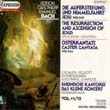
|
CARL PHILIPP EMANUEL BACH
Oratorium "Die Auferstehung und Himmelfahrt Jesu" (Wq 240)
Kantate "Gott hat den Herrn auferweckt" (Wq 244)
Schlick, Lins, Elliot, Prégardien, Schwarz, Varcoe
Capriccio 10206/07, 1988
listen to / order at JPC ... (Gesamtedition) |
|
Preis der Deutschen Schallplattenkritik (LP Critics’ Prize) Deutscher Schallplattenpreis 1988 (German LP Prize) |
|
|
 |
|
